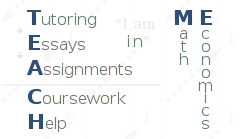Section 2.2: Problem 29-A Solution
Working problems is a crucial part of learning mathematics. No one can learn... merely by poring over the definitions, theorems, and examples that are worked out in the text. One must work part of it out for oneself. To provide that opportunity is the purpose of the exercises.
James R. Munkres
(Addiotional) Assume the only parameters in the language are the quantifier symbol and a two-place predicate symbol
. And assume the language does not have the equality symbol.
(a) Find a sentence that is satisfiable, but has no models of size 3 or less.
(b) Does part (a) generalize to numbers other than 3?
(c) In part (a), can we replace "or less" by "or more" and still find a sentence?
(a), (b) Consider the sentence
. Every model
of
is such that a) for every
,
, and b) there are
such that for
,
, implying
. Then,
has no model of size
or less.
(c) This part is related to the remark of Exercise 22 (upward Löwenheim–Skolem theorem without equality), which implies that if there is a model of a sentence
in a language without the equality symbol of size
, then there is a model of size
. Indeed, having a model
of
of size
, we add a new element
to its universe, and consider a function
from
onto
which is the identity for all elements of
and assigns any element
to
. Then, by choosing
appropriately (
iff
, and
iff
),
is a homomorphism of
onto
, implying, by the Homomorphism Theorem, part (d), that
and
are elementarily equivalent, and
is true in
. Therefore, the answer is no, in (a) we cannot replace “or less” by “or more”.
